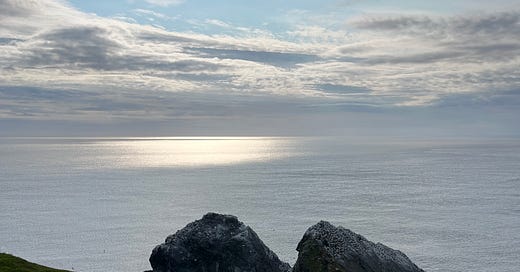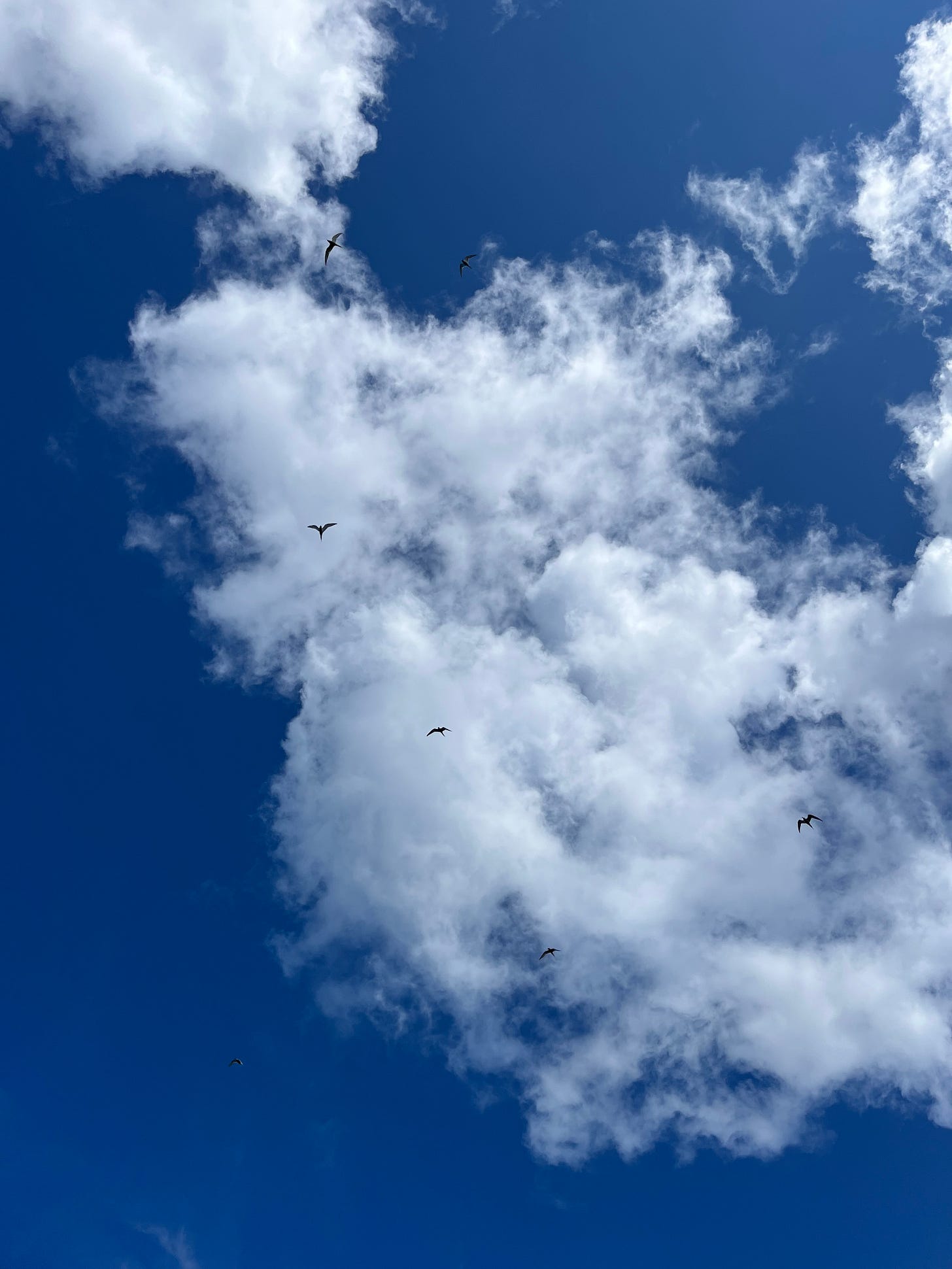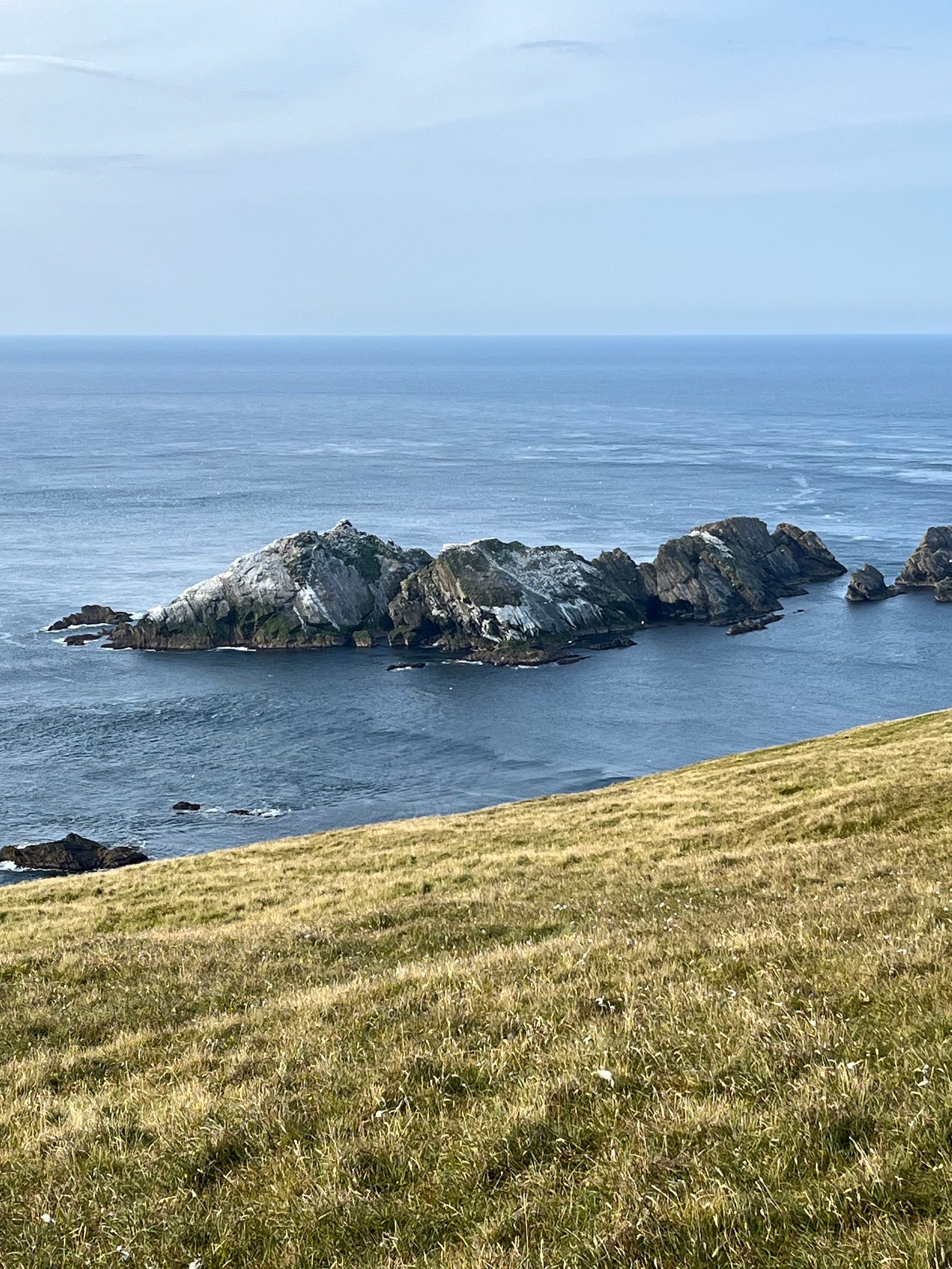As the Crow Flies: on belonging
a summer spent watching birds instead of cooking; still, a pasta bake
I. 55.8617° N, 4.2583° W
It’s Sunday evening and the sky is Glaswegian. The colour of relief on the skin, somewhere between the lilac and the grey, like an ephemeris scar after unclasping a tight sports bra, or a healing bruise. The breeze is light, the day overstretching with the confidence of August, or the end of summer, so we head out for an amaro after dinner. A friend, whom I haven’t seen in months, has come to stay with us, and we’re deep into a conversation when a stranger sits next to us. He asks where we’re from, his face as burgundy as the wine he is holding in his hand.
Turkey. Italy. France. We answer in a chain.
I fucking love France. Is his response. Followed by, as he puts his arm around my shoulders, more talking about Biarritz and other towns around the area. I can’t hear all the words he spits well, though I’m guessing Spanish names. I don’t ask.
He keeps talking: the food, the markets, the infrastructures, the cheaper stuff he buys there.
I wouldn’t know: I tell him that I have never been to this part of France. France is a big country, I think to myself, and I don’t visit often.
I wasn’t listening anymore when he asked about our itinerary.
We live here, Ludo says. We’ve arrived.
So the man starts distorting his face grotesquely, wiggling his legs as fast as maggots over a decaying animal’s skeleton, the eyes of an owl. Why, he says, Why, Why would you live here and not in France, he asks time and again.
I turn my upper body away, gazing at the seagull that’s wrestling with leftover fries and pizza crusts next to a public bin. I think that when I first moved to the UK, ten years ago as of next week, anyone who came to visit me from where I had come from, noticed how many seagulls there were in London. They were ecstatic about the discovery: it feels like we’re on a seaside holiday, a friend had told me.
Gulls are migratory birds, however seagulls in the UK tend to stay put all-year-long. I remember a London friend who once said to me that seagulls don’t squawk but laugh here, like rewarded thieves, he added.
By the time I meet Ludo and my friend in the eyes again, the man has moved on to reviewing Turkey. He has gone on holiday to Italy as well, he proudly adds.
II. 60.7416° N, 0.9049° W
An earlier evening, still in July but on Shetland, we walk between gullies and secluded beaches, petting both red and volcanic rocks; we climb bright cliffs where, against the currents of the Atlantic, the sky is deep blue and infinite. The weather can change in a sentence here. It’s 6pm and Ludo and I are switching our wellies for hiking shoes on the way to Hermaness, which is the northernmost Nature and Wildlife Reserve in Britain.
The footpath follows an uphill way and has been fitted with raised, wood board panels to protect the bogs on each side. The mossy land is loud with a choral of toads, smelling like old rain, and the wind pushes us back downhill. My bones feel like porcelain, my skin as thick as tyres, stretched, and we keep bouncing back against each one of the stronger wind gusts.
I can’t tell you what time it is when we arrive. The weather has made a point of not holding us accountable to a schedule since setting foot on the Shetland archipelago.
The noise alerts us first. A throaty chirping echoes, the deep noise of heavy diving gives the song a rhythm – like living shouting stars – and we grow hopeful for a frenzy. Sun streams cut through the clouds, the ocean has the colour of foil. Then, there is a rock. One rock, perhaps 50 metres away from the shore, although my sight isn’t good enough to make this a reliable information. And, on that one rock, there are thousands of birds.
Have you ever seen a gannet? It is huge. With white and wide wings, spiky black ends, and large blue eyes. It is beautiful and terrifying, as magical as any flying species can be. Gannets live in cloisters and have a life expectancy of forty to fifty years; that, I read on a sign from the Royal Society for the Protection of Birds.
And I sit and I cannot move any further. As I’m watching the birds hunt and fight and fly and land, they seem furious to me – alive in this world – and I can’t stop thinking that, regardless of how many similar-looking rocks I’ve passed since I started walking the coastline of Shetland, this colony of gannets returns to that one rock every year. That they fly across countries and continents, through the four seasons, and return to that one rock, which is one of two homes for the gannets in Scotland.
III. 31.5017° N, 34.4668° E
Back in June 2024, Palestinian birdwatcher Mohamad Shuaibi explained that you need to go out early in the morning to watch birds, but military operations take place early in the morning too, so ‘you can be shot if you’re out around this time’. It was spring and a genocide was already happening in Gaza, and millions of birds flew over the occupied territories of Palestine, which is the world’s second-busiest corridor for bird migration.
‘The migration hasn’t stopped’, says Shuaibi. ‘These birds, despite the war, they are still coming. And it gives us hope.’
I was reminded of Marwan Makhoul’s poem, again:
In order for me to write poetry that isn’t political
I must listen to the birds
and in order to hear the birds
the warplanes must be silent.
– Marwan Makhoul
The first time I had read the poem, the weather was still autumnal outside my window. Now the trees have grown new leaves in Glasgow, but the bombs are still dropping on hospitals and libraries and civilians and homes and allotments and seas in Gaza. And every time I look up and spot a bird, either flying or nesting, I say it again: Free Palestine. Free the birds and the Palestinian people and the Palestinian land. As helpless as the words may sound in this violent world, language is never innocent.
IV. 48.8575° N, 2.3514° E
It’s still August in Glasgow. More friends have come to visit us, stopping by our flat on their way back to France after a trip to the highlands. They’re sitting at my dining table, with which they’re familiar from my previous flats, but this is their first time in Scotland. They always speak fast, tweeting and giggling faster when we’re reunited because we share a language; these women are my childhood friends, and we talk in idioms together. It baffles any adults around us.
They tell me that they watched the closing ceremony for the Olympics on their phone, the three of them squeezed on a bed as the rain poured heavily outside the window of their accommodation. They add that they’ll miss that Paris when they return home. You know, they insist, the city was filled with fanzones, concerts and pop-up bars, and people who were happy to be here, celebrating.
It was like being on holiday in Paris, one adds with a bright smile.
They sing one of the summer tunes for this year and all I can think of are the cooing pigeons. That, where I had come from, it wasn’t exactly Paris. It was on the other side of the périph, where buildings were high and cramped, and the pigeons nested at the corner of our balcony, behind our bikes so we wouldn’t bother them (therefore we stopped using our bikes). Then came the week when the eggs hatched. With my mother we made a pact not to open the window until they would become strong enough to wing it and leave us behind. But I always had to break a rule – and I was the one who spent most time at home – so I opened the window, and the pigeons came in and got scared and flapped their wings and hit the walls, and they shat everywhere.
One of my friends puts her hand over mine, suddenly but warmly, and she asks if I think they should go to Edinburgh or spend the day in Glasgow on Friday.
I consider their question, easing myself back into the conversation with a nod, where I belong. And I feel guilty for my escapes.
V. 43.7700° N, 11.2577° E
When we’re in Florence with Ludo, we drink our coffee at our friend’s restaurant on Santo Spirito. It is there we call home, between us, but it’s not always there that we belong. Swallows pass through the city every year, flying in flocks.
Una rondine non fa primavera, as Ludo reminds me when we’re not in Italy but thinking about Florence.
Primavera, spring, becomes summer in the English language as ‘one swallow does not a summer make’ – and seasons roll, as the crow flies, and our language maps our world.
VI. 55.8617° N, 4.2583° W
Back in Glasgow, I set off for my run early so I can reach the necropolis on time for sunrise. The air is cold but the sun is lifting above the canal, the light strong enough to make me feel as sharp and unbreakable as glass. As it happens often, I drift away with my own thoughts and get lost. Where am I?
Where was I, is what I’m asking. A maze is built in the past tense, always. Whenever I’m looking for an exit, for a solution or an answer, I’m addressing the past and the paths where I got lost before. I’m seduced by the idea that I could rebuild those to make me feel less vulnerable today. That perhaps, one day, I will go back to France and bite into a thick fruit from the market stall and feel only joy for it, flying in to find my flock.
In All About Love, Bell Hooks explains that we, as a society, still expect children will be taught how to love in their household while growing up. Then Hooks asks: but what happens when they aren’t?
As I keep running, I catch sight of a magpie basking in the horizon. My grandmother once told me that magpies can predict the weather. She used to say that magpies are the souls of gossiping women too.
I call Mamie when I get home. And I send her a photo as we speak, so I can tell her about the gannets.
Magnifique, she says. I’m taught that they’re called Fou de Bassan in French.
It surprises me, so I research the origin of the name. ‘Morus bassanus’, from the Latin morus, in allusion of the bird’s character, and Bassan, in relation to Bass Rock, an island in the Firth of Forth, which is the main home of the gannets in Scotland. The other home, when they aren’t up in Hermaness, Shetland.
If you haven’t seen a gannet before, it might be helpful to know that they migrate in a loop. Their journey begins in Scotland, before heading south through the English Channel in late October, through southern European waters to West Africa in November, wintering there during December and January, and they return to the west of Ireland in February, and back to Bass Rock to forage through the southern North Sea and north of the Norwegian Sea during March.
As the crow flies, in a loop, not one of us is free unless we all have access to a safe refuge along the migrating route.
Margaux
PS. Last week, for the annotated recipes series, I sent a letter from Shetland that includes a recipe for a Smoked Basa and Chestnut Mushrooms Pasta Bake. These usually go out to paid subscribers on Mondays, but I’ve unlocked the post, so you can now access it and find the recipe here:
#26: from Shetland
I. It was on Fetlar, an island inhabited by 60 people and nicknamed ‘the garden of Shetland’, that I caught up with the version of myself I had been chasing since arriving on the Shetland archipelago. The journey had been chaotic. The fog banned visibility, and we had to reverse our way into the commuter’s ferry as there wouldn’t be enough space on the …
PPS. If you enjoy this newsletter, feel free to forward it to a friend, or two.
And, if you’ve been forwarded this email, you can subscribe here:










Beautiful! I love the way your words circle and rest in place, like the flight of the Gannets.
I looooved this